The Last Samurai Review
Deepa Menon / fullhyd.com
Performances
Script
Music/Soundtrack
Visuals
NA
NA
NA
NA
Suggestions
Can watch again
NA
Good for kids
NA
Good for dates
NA
Wait for OTT
NA
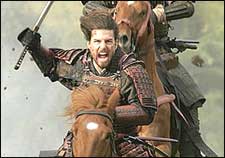
Despite his somewhat distracting hunk-status, Tom Cruise's always been a good actor. In an open-faced, boy-scout kind of way. Like he was in Jerry Mcguire, when his successful career ended the day his conscience awoke. That's how Cruise got stuck in our heads - the guy with a whole army of personal demons and only one truth to hold onto to keep him sane. That's also Captain Algren. Only, with some serious kickass potential.
The story is set in late 19th century Japan, a country eagerly courting development and the Western way of life. Kimonos are replaced with trousers, swords with firearms and warriors with politicians. And the land's oldest defenders, the Samurai, are fast becoming an extinct species. But they refuse to go quietly into the night.
The story is set in late 19th century Japan, a country eagerly courting development and the Western way of life. Kimonos are replaced with trousers, swords with firearms and warriors with politicians. And the land's oldest defenders, the Samurai, are fast becoming an extinct species. But they refuse to go quietly into the night.
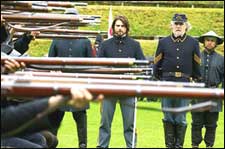
To quell their uprising and train the army in the art of gunfare, Captain Algren, an American war-hero, is brought to Japan on His Emperor's command. Cocky and sure, but plagued by nightmares of the battlefield, Algren is in an eternal conflict with the Powers That Be, even before he reaches Japan. But it's good money, and that usually wins most arguments.
In their first encounter with the Samurai, Algren is captured, but spared his life only because he won't quit fighting. It's almost like he doesn't know how to. This wins him the slightly amused fascination of the chief of the tribe, Katsumoto (played wonderfully by Ben Wantanabe). So Algren, Yankee accent an' all, goes to live in the almost surreal world of the Samurai village.
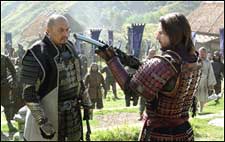
Surreal because the air at the village of one of history's fiercest warriors is that of idyllic peace. The movie captures beautifully, the quest for perfection that fuels every moment of their lives. And despite the Samurai's distrust and dislike of the Captain (they think the Cruise Man repulsively ugly), their ways and philosophy of life make more sense to Algren than anything ever has. For the first time in his life, he sleeps peacefully at night.
The director has extracted some great performances by the entire cast, so no character overshadows anyone else, and there is no good-guy/bad-guy. You're with the Samurai all the way, but you don't grudge the misguided Emperor either - he's just a child.
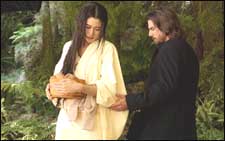
In the village, Algren lives at the home of a warrior he killed. He is looked after and tended to health by the man's widow, Taka (a luminous Koyuki). Yes, love does blossom. But that's where this movie is different from others - the most erotically charged scene between the two is one where she is dressing Algren for his last battle as Samurai. Any director who can create steam with both his actors fully dressed has a good thing going.
And that's what this movie does - it takes all those movie clichés (war, love, honour, dying for a cause) and makes them work. And how. The fights are fluid, with an economy of movement that makes them very credible. None of that show-offy classroom crap. And humor surfaces at the most unlikely moments. A good line, as it turns out, works even better in subtitles.
Through a series of political manipulations, the Emperor has his arm twisted to withdraw support to the tribe and order their vanquishment. Algren follows his destiny and trains to become a Samurai to assist them in their final war.
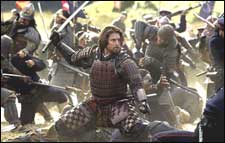
The last battle of the Samurai is scripted and filmed so it's neither excessive nor filmi. Much like the rest of the movie. It isn't common to see a big-budget film shot with such elegance. Usually all those lavish props and sets tend to get in the way of simple storytelling. But this story is told like it should be, by someone who's as captivated as you are by the characters he's creating.
THE LAST SAMURAI SNAPSHOT
THE LAST SAMURAI USER REVIEWS
1 - 1 OF 1 COMMENTS
24 USERS
Performances
Script
Music/Soundtrack
Visuals
NA
NA
NA
NA
Can watch again - NA
Good for kids - NA
Good for dates - NA
Wait for OTT - NA
maybe even deserves 4 and a half. IMHO, fair review but underrated the movie.
RATING
8
LEAVE A COMMENT
fullhyd.com has 700,000+ monthly visits. Tell Hyderabad what you feel about The Last Samurai!
MORE MOVIES
SEARCH MOVIES
Dissatisfied with the results? Report a problem or error, or add a listing.
ADVERTISEMENT
SHOUTBOX!
{{ todo.summary }}... expand »
{{ todo.text }}
« collapse
First | Prev |
1 2 3
{{current_page-1}} {{current_page}} {{current_page+1}}
{{last_page-2}} {{last_page-1}} {{last_page}}
| Next | Last
{{todos[0].name}}
{{todos[0].text}}
ADVERTISEMENT
This page was tagged for
The Last Samurai english movie
The Last Samurai reviews
release date
Tom Cruise, Ken Watanabe
theatres list